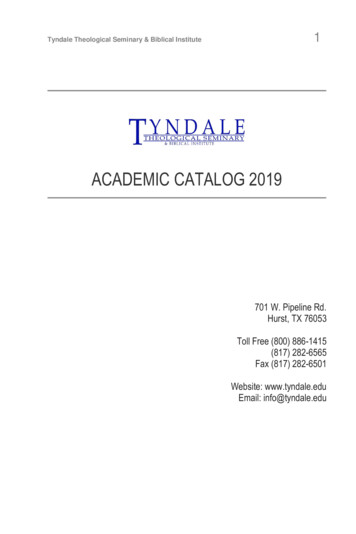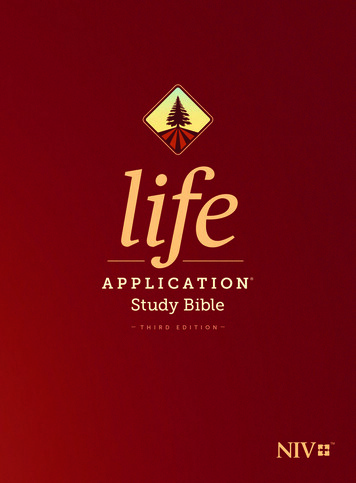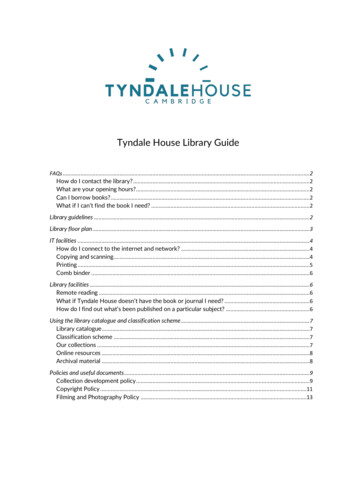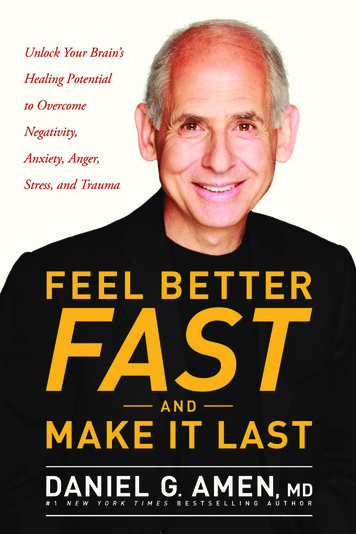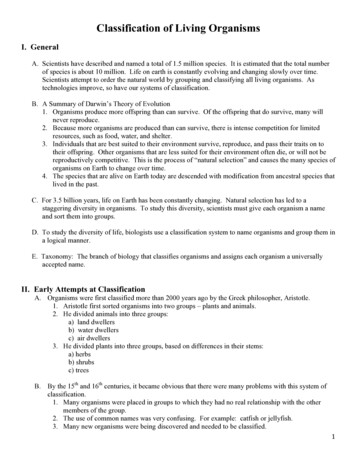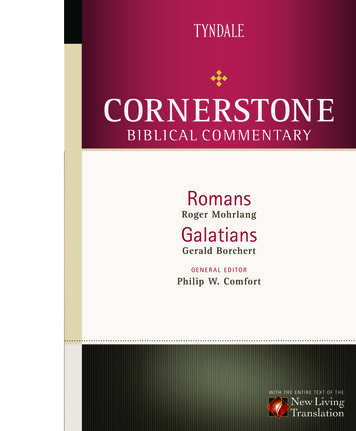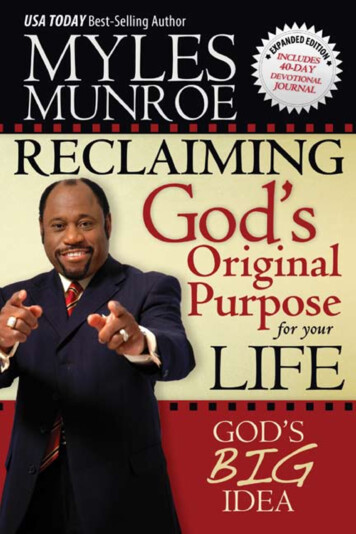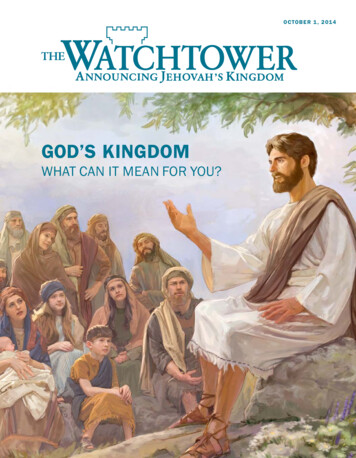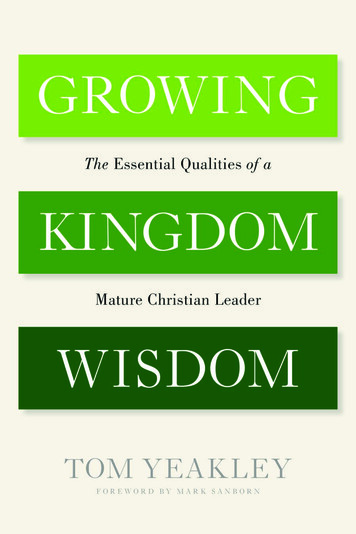
Transcription
Decades ago, I was introduced to the daily habit of reading thechapter of Proverbs that corresponds to the day of the month(thirty-one chapters for thirty-one days). I was recently astonishedto realize that because of that discipline, I’ve read the entire bookof Proverbs almost five hundred times. Yet in Growing KingdomWisdom, Tom Yeakley points out several key insights from theendless treasures of Proverbs that I had read but not recognized.I believe that any Christian, but especially those in leadership roles,could profit from the years of study that Yeakley has condensed inthis book. If you long to grow in Kingdom wisdom, along withreading the Proverbs themselves, read this book.DONALD S. WHITNEY, professor of biblical spirituality and associate dean atThe Southern Baptist Theological Seminary; author of Spiritual Disciplines for theChristian Life and Praying the BibleGrowing Kingdom Wisdom by Tom Yeakley is comprehensive,challenging, and convicting. I count this as an essential study forany leader who seeks an intentional path to godly wisdom andspiritual growth. Yeakley generously provides tools that create thediscipline required for the divine process of transformation toadvance its work in you.TAMI HEIM, president and CEO, Christian Leadership AllianceWisdom is one of the qualities most needed by leaders, yet isthe hardest to develop. It is more of an art than a science, takingtime and humility to develop. Tom Yeakley has done a superb jobhelping us know not only what Kingdom wisdom is but moreimportantly, how to grow in it, letting its benefits impact everyarea of our lives and leadership.TOM HUGHES, colead pastor, Christian Assembly Church; author of Curiousand Down to Earth
The list of desirable leadership qualities fills thousands of books.Tom Yeakley condenses the list to one absolutely necessaryelement—wisdom. “Wisdom is supreme; therefore get wisdom.Though it cost all you have, get understanding” (Proverbs 4:7,niv). Wisdom is the glue to all the other leadership qualities. Thequest for godly wisdom seems to be too indefinable to be pursued.Tom beautifully takes the mystery out of the search and givesincredibly practical help in growing this life of wisdom. It’s nota formula, but rather a process of practice, discovery, and deepcommitment. The teaching of this book will give power to yourlife and leadership.JERRY E. WHITE, major general, United States Air Force (retired)Wisdom is one of those blessings from God I honestly neverthought of as something to be worked on. Received, yes of course,as Solomon received wisdom from the Lord. Earned by thewrinkles and gray hair of old age? Also of course. But something toactively and intentionally work toward? To be honest, no, I hadn’tgiven that much thought. And yet Tom Yeakley has outlined a wayto do just that in his book Growing Kingdom Wisdom. It made mepause, reflect, and pull out my yellow highlighter more than a fewtimes!ROY GOBLE, author of SalvagedAll leaders need wisdom. Tom’s book will help them! It is lacedwith helpful insights for finding and using “wisdom from God.”Tom is a leader who demonstrates such wisdom from God in hisown life and ministry. He backs up what he says in his book bymodeling what it means to live and lead wisely.BOBBY CLINTON, author of The Making of a Leader
GROWINGThe Essential Qualities of aGrowing Kingdom WisdomKINGDOMThe Essential Qualities of a Mature Christian LeaderMature Christian LeaderWISDOMTom YeakleyTOM YEAKLEYNavPressA NavPress resource published in alliancewith Tyndale House Publishers, Inc.
NavPress is the publishing ministry of The N avigators, an i nternational Christianorganization and leader in personal spiritual development. NavPress is committed tohelping people grow spiritually and enjoy lives of meaning and hope through personaland group resources that are b iblically rooted, culturally relevant, and highly practical.For more information, visit www.NavPress.com.Growing Kingdom Wisdom: The Essential Qualities of a Mature Christian LeaderCopyright 2019 by Thomas R. Yeakley. All rights reserved.A NavPress resource published in alliance with Tyndale House Publishers, Inc.NAVPRESS is a registered trademark of NavPress, The Navigators, Colorado Springs, CO. TheNAVPRESS logo is a trademark of NavPress, The Navigators. TYNDALE is a registered trademarkof Tyndale House Publishers, Inc. Absence of in connection with marks of NavPress or otherparties does not indicate an absence of registration of those marks.The Team:Don Pape, PublisherDavid Zimmerman, Acquisitions EditorElizabeth Schroll, Copy EditorJulie Chen, DesignerUnless otherwise indicated, all Scripture quotations are taken from The Holy Bible, English StandardVersion (ESV ), copyright 2001 by Crossway, a publishing ministry of Good News Publishers.Used by permission. All rights reserved. Scripture quotations marked NIV are taken from the HolyBible, New International Version, NIV. Copyright 1973, 1978, 1984 by Biblica, Inc. Used bypermission. All rights reserved worldwide. Scripture quotations marked NASB are taken from theNew American Standard Bible, copyright 1960, 1962, 1963, 1968, 1971, 1972, 1973, 1975,1977, 1995 by The Lockman Foundation. Used by permission. Scripture quotations marked CSBhave been taken from the Christian Standard Bible, copyright 2017 by Holman Bible Publishers.Used by permission. Christian Standard Bible and CSB are federally registered trademarks ofHolman Bible Publishers. All rights reserved.Some of the anecdotal illustrations in this book are true to life and are included with the permissionof the persons involved. All other illustrations are composites of real situations, and any resemblanceto people living or dead is purely coincidental.For information about special discounts for bulk purchases, please contact Tyndale House Publishersat csresponse@tyndale.com, or call 1-800-323-9400.Cataloging-in-Publication Data is available.ISBN 978-1-63146-916-9Printed in the United States of America257246235224213202191
CONTENTSForeword ixIntroduction xi1The Foundation of Godly Wisdom 1Par t One:T H E C O M PA N I O N S O F G O D LY W I S D O M234Prudence 11Knowledge 25Discretion 43Par t Two:T H E C O M P E T E N C I E S O F G O D LY W I S D O M5678Counsel 57Sound Judgment 71Understanding 85Power 101Conclusion: The Characteristics of Godly Wisdom 115Epilogue 123Acknowledgments 125Appendix: Wisdom-Development Resources 127Notes 161
FOREWORDWisdom is timeless, not trendy. While people of different generations have sought or ignored it, it has never wavered as the driver oflasting success and effective leadership, nor will it ever be supplantedby new inventions or technology.Investing your time in reading this book is a wonderful way tostart or improve your journey to wisdom.Much is written about wisdom from the secular viewpoint, andcertainly there are wonderful concepts and ideas to be learned inthat writing. But wisdom ultimately comes from God. Knowing thesource of true wisdom is essential to developing it in your own life,and this book illustrates that clearly.I constantly remind myself of the story in 2 Chronicles 1 whenGod appeared to Solomon and said He’d give him whatever he asked.Solomon could have understandably asked for wealth, strength,and long life, but instead, he asked for wisdom so he could lead thepeople. God’s response? He gave Solomon wisdom and riches, wealthand glory. This is a classic example of putting first things first andgetting the other things as a result.Would you have asked for wisdom? Would I? Here is a paradox:Only those with some wisdom would know to ask for it. Obviously,ix
G ROW I N G KI N GDO M W IS D OMGod gives us wisdom, but we are not exempt from applying our ownthinking in the quest for it.Tom Yeakley has a heart for next-generation leaders, and thisbook is not only proof of that but a contribution to those leaders’development. I share this commitment and passion, and I pray thatthese concepts are embraced by all who read them, but especially byour future leaders.As someone who has the privilege to address, teach, and developleaders, I often share this concept: If you want to lead better and bebetter, use the FIT tools—frequency, intensity, and technique. Howdoes that relate to wisdom? To be wiser:1. Increase the frequency with which you pursue, study, andreflect on wisdom. Replace lower-value activities with themore frequent intentional pursuit of wisdom.2. Don’t dally—use intensity. Be committed, devoted, andintensely focused on what you have experienced, whatyou have learned, and what you need to do to becomewiser. Your growth in wisdom will be proportionate to theintensity with which you pursue it.3. Use the best techniques. Rather than taking a haphazardapproach (ironic if you are a student of wisdom), use thebest systems and processes. Here’s some great news: Thisbook is full of techniques and processes for increasingwisdom.The etymology of philosophy is “love of wisdom.” By that standard, you are a philosopher in the most practical (and perhaps best)sense of the word for reading this book.Mark SanbornDenver, Coloradox
INTRODUCTIONIf you don’t know where you’re going, you might not get there.Yogi BerraBegin with the end in mind.Stephen CoveyI was sitting across my desk from one of my direct reports. He hadcome to me for advice on how to solve a problem he was facing. Hisoptions were several—all with some good and bad consequences.Which one should he choose?As I listened to him, I was having a conversation with myself. He’sgoing to expect me to have an answer for him. What should I tell him? Hehad a good handle on the issue, but which of these solutions wouldbe his best option? I wasn’t sure what to do. It was a judgment callbetween a good, better, and seemingly best solution.“I need wisdom, Lord,” I prayed. “Give me wisdom that comesfrom You, Lord, to help me see what solution we should embracehere.”We often find ourselves out of our depth when seeking to solveproblems or determine a way forward from our current situation.Issues that are black and white are quickly solved, but many problemsxi
G ROW I N G KI N GDO M W IS D OMare gray. They present with complexities we have never seen, and ouroptions don’t present as clear solutions.The more responsibility one has, the more regularly one is dealing with these types of gray issues. The more obvious ones have beenhandled by others before they arrive at your desk.Leaders in any context need wisdom, and Kingdom leaders desperately need it to lead well according to God’s Kingdom values andpurposes. This Kingdom we refer to is the rule and reign of JesusChrist: Kingdom leaders are seeking to advance Christ’s rule andreign among the people of this world.Leaders in any context are reliant on wisdom, and the best leadersare conscious of that reliance and seek wisdom in every situation. Inworldly contexts, Kingdom priorities are not necessarily valued, sosolutions are based largely on judgment, which arises primarily fromexperience. For those who are observant, the repetition of experiencesover time reveals patterns of actions and their resulting consequences.Thus, one can begin to predict certain outcomes based on decisionsand choices made.But without a fixed standard to know if something is truly wise,we are forced to measure our wisdom by results: If the results arewhat we desire, then we assume the pathway to achieving them waswise. This view of wisdom leads to “end justifies the means” thinkingand ignores the higher moral values and eternal purposes of God’sKingdom.Simply because one has a lot of experience does not necessarilymean that person is growing in wisdom. What is labeled wisdomcould simply be repetition. Unintended consequences may be hidden from view; moral compromises may be clouded over. A leader’srésumé may show significant growth, but perspective, insight, anddiscernment—true wisdom—may remain stagnant.Those of us who accept the primacy of God’s Kingdom have anobjective standard—the Word of God—to test our decisions against.xii
I ntroductionWorldly wisdom can’t claim such a standard, so the wisdom gainedfrom experience is vulnerable to folly.True wisdom is from God Himself. It is given to those who askand pursue it from Him. It can come as a gift from God or be gainedas one sorts experiences that align with Kingdom values and discardsthose that don’t. We prioritize outcomes that further God’s Kingdompurposes and bring honor and glory to Him. We seek to lead in waysthat align with His Kingdom values as reflected in His character.How we arrive at our results is just as important as what our results are.Several decades ago, I began to focus on the personal pursuit ofwisdom, particularly as it applied to leadership. I was challenged byreading James 1:5: “If any of you lacks wisdom, let him ask God, whogives generously to all without reproach, and it will be given him.”I had studied the life of Solomon and knew that his request for wisdom to lead was pleasing to the Lord. I knew, therefore, that I couldask for something similar and enter that same pursuit of wisdom withconfidence that I, too, could find favor from the Lord and becomea godly, wise Kingdom leader. But what is godly wisdom? How is itdifferent from the wisdom of the world? How do we intentionallypursue it? Where do we begin? How do we know that we’ve obtainedit? And how can we pass it along to someone else?This book is my attempt to take the mystery out of pursuingwisdom. We’ll look at what Kingdom wisdom is according to theScriptures, breaking wisdom into its component parts and seeinghow they interrelate. We’ll contrast godly wisdom in its various attributes with the wisdom of the world to help us distinguish betweenthe two. We will also address how wisdom applies to leadership aswe seek to accomplish God’s mission and the tasks He has calledus to do.Although this book is written with positional leaders in mind,everyone needs wisdom for living a life pleasing to God. All of us arestriving for that end-of-life affirmation from the Lord: “Well done,xiii
G ROW I N G KI N GDO M W IS D OMgood and faithful servant” (Matthew 25:23). If that is the goal, whatroad should we take now that will lead to that destination of becoming a wise leader in God’s eyes? Whether you are just beginning ajourney of pursuing God’s wisdom or you desire a boost in your current wisdom-seeking journey, this book is for you.When I talk to other people about their growth and development,we quickly move to two essentials of great leadership: character (aleader’s personal example that backs up their words) and wisdom(a leader’s quality of decision-making). This is true for all leadersregardless of context, but it is particularly true—and these qualitiesare particularly in view—for Kingdom leaders. They know that boththeir spiritual health and their Kingdom influence depend on theirintentional pursuit of Christlike character and godly wisdom. Butwhile a quick perusal of the leadership section of the local library orbookstore quickly validates “worldly wisdom,” few leadership booksask how to know that God is pleased with our leadership. Asking thatquestion is, in fact, counterintuitive to worldly wisdom. Leadershipis too complex, the facts on the ground are shifting too quickly, andtoo many cultures are colliding in front of us to pause and reflect.Yet a world that is so turbulent and chaotic demands a wisdomthat is otherworldly. Kingdom leaders—those seeking to honorGod with their leadership and accomplish His purposes—knowthat they must give an account of their leadership to the Lord (seeHebrews 13:17).By God’s help and grace, we can see character change and growthtoward spiritual maturity over time. Yes, sometimes it seems like it’stwo steps forward and one backward, but overall, we can see net gainsin our character development when we seek after it. We live and leadmore out of who we are than what we know—especially when weare under pressure.But good character alone does not ensure good leadership. There aremany people with godly character who cannot lead! Competencies,x iv
I ntroductionstrategies, and tactics must also be developed if one is to lead well.And underlying all of this must be the pursuit of the otherworldlywisdom of God’s Kingdom. God-given wisdom brings God-honoringresults that will stand the test of time.GET TING THE MOST OUT OF THIS BOOKThis book is designed as a tool to help you become more intentionalabout pursuing godly wisdom—both for yourself and for those youare leading. The book addresses seven key aspects of godly wisdomand how to grow in these vital areas. A chapter is devoted to each ofthese seven components, describing how each can be identified andimplemented.It is not enough to simply know you must grow, however; youmust also become intentional about growing. Therefore, the end ofeach chapter contains a short section to assist your reflection onthe component of wisdom just discussed. Each devotional reflectionconsists of a few key Bible passages to study, items to incorporate intoyour prayer time, and suggested personal applications.The appendix is an extension of these chapter resources. Thewisdom-development resources in the appendix consist of four parts:1.2.3.4.a topical Bible study;Scripture-memory verses related to the topic;personal prayer focus items; andpractical exercises for application in life and leadership.Bible StudyThe topical Bible studies in the chapters and the appendix are notmeant to be exhaustive, only to get you started. Personal convictionsare rooted in our lives by doing personal Bible study on a given issue.If you have placed your life under the authority of the Scriptures andxv
G ROW I N G KI N GDO M W IS D OMdesire to obey Him whom you serve, knowing what the Bible says onany subject is foundational. You must know the commands of Godbefore you can obey them (see John 14:21).Begin your pursuit of wisdom by doing the topical Bible study,developing and deepening your personal beliefs and convictions.Knowing what God says about wisdom and understanding its application to life and leadership will provide a great foundation for usefulcontribution. For more in-depth study on a topic, consider usinga topical Bible to discover more related passages or cross-referenceindividual verses using a study Bible.When you study the Bible, always be mindful that the desiredoutcome is to understand and apply the Word of God to your life.Follow the example of Ezra, who not only studied the Scriptures butalso obeyed them and then taught them to others (see Ezra 7:10).D. L. Moody said, “The Bible was not given to increase our knowledge, but to change our lives.”1Memory VersesHaving developed and deepened your personal convictions, you cannow begin to integrate them into your life. Memorizing selectedpassages (I’ve recommended some in the appendix) will provide youthe opportunity to meditate on God’s Word and give the Holy Spirita tool He can use to shape and guide your decisions. He can bringthese passages to your mind as you interact with people, make dailydecisions, and solve problems.You must train yourself to be sensitive to the prompting of Hisvoice as you go through your daily responsibilities. The prophetIsaiah reminds us that we can count on the Lord’s guidance: “Yourears shall hear a word behind you, saying, ‘This is the way, walk init’” (Isaiah 30:21).Begin to memorize the suggested memory verses or select passagesfrom the Bible study. Be sure to memorize the references along withxvi
I ntroductionthe verses to enable you to recall them quickly and accurately. Manypeople find it helpful to repeat the reference before and after the verseas they memorize it.To further develop the habit of Scripture memory, a helpful toolis the Topical Memory System.2 Its sixty verses arranged in thirtydisciple ship topics will help lay a solid foundation in your heartand mind.Prayer ItemsThe process of character transformation is a divine work that requiresdivine power for lasting change. Begin to pray regularly about thesetopics, asking God to help build them into your life. Ask God forsensitivity and a growing self-awareness of areas that require change.Pray for grace to grow and develop in these key aspects of wisdom.Many people find it helpful to write out their prayer requests ina small notebook and pray through these prayer requests daily. Awritten guide can help bring focus and concentration as you pray.Consider taking an extended time away with the Lord—a half day,for example—to focus your prayer time on specific topics of concernor need. Ask the Lord to help you apply what you are learning.Set aside regular time each day to pray over these areas of wisdom.The length of prayer time is not as important as the attitude of yourheart. Earnestly asking God for help in character change, allowingthe Spirit to speak to your heart, and then responding to His leadingwill create fertile ground for transformation. Seek to pray faithfullyover these areas, remembering to thank God for positive changes younotice and confess your sins as He reveals them.Practical ApplicationsEvery component of wisdom has a suggested list of application exercises. Some exercises are short-term, with the objective of sensitizingyou to areas for growth. Others are more long-term projects thatxvii
G ROW I N G KI N GDO M W IS D OMrequire persistence and perseverance to see permanent change. It isnot within your power to change—that is, to make yourself wise.These exercises simply present opportunities for the Lord to do adeeper, longer-lasting work within you. It is the Lord who changesyou, not you yourself.Paul reminds us to “walk in a manner worthy of the calling towhich [we] have been called” (Ephesians 4:1), and we can do soby making sure that our practice matches our profession. Jesus hadhard words for the religious leaders of His day whose knowledge andleadership practices were not congruent. God does not use hypo critical leaders for great Kingdom tasks! As James exhorts us, “Be doersof the word, and not hearers only, deceiving yourselves” (James 1:22).The applications center on the tools most often used by God toshape us: the Word, prayer, and life experiences. Hopefully, as youapply what you learn, you will form new beliefs and behavior patterns that affect your life and leadership.WISDOM IS A BLESSINGThe pursuit of wisdom must be intentional for us to truly see itestablished in our lives. We are called to pursue wisdom as a priority.This endeavor will require effort, discipline, and a learner’s heart, andit will be met with a blessing.Blessed is the one who finds wisdom,and the one who gets understanding,for the gain from her is better than gain from silverand her profit better than gold.She is more precious than jewels,and nothing you desire can compare with her.Long life is in her right hand;in her left hand are riches and honor.xviii
I ntroductionHer ways are ways of pleasantness,and all her paths are peace.She is a tree of life to those who lay hold of her;those who hold her fast are called blessed.Proverbs 3:13-18You are about to begin a great journey of intentional personalgrowth and change. Set your face “like a flint” (Isaiah 50:7) to see itthrough. Don’t be discouraged if it seems hard to measure change andgrowth; trust God to do what He has promised. “If any of you lackswisdom, let him ask God . . . and it will be given him” (James 1:5).Trust Him who promises, “He who began a good work in you willbring it to completion at the day of Jesus Christ” (Philippians 1:6).xix
1THE FOUNDATION OFGODLY WISDOMEveryone then who hears these words of mine and does them will be like awise man who built his house on the rock. And the rain fell, and the floodscame, and the winds blew and beat on that house, but it did not fall, becauseit had been founded on the rock. And everyone who hears these words ofmine and does not do them will be like a foolish man who built his houseon the sand. And the rain fell, and the floods came, and the winds blewand beat against that house, and it fell, and great was the fall of it.J e s u s , i n M at t h e w 7 : 2 4 - 2 7Building a house in the foothills of Colorado Springs, where I live,can be difficult. The soil near the mountains is a mixture of sand andclay. The clay component expands and contracts with the amount ofmoisture present, creating very unstable building sites. All buildersmust do soil tests before building begins and then design foundationsthat can adjust to the changing dynamics of the soil underneath. Thesoil type determines the foundation that is laid. And as with all buildings, it is the foundation that is the key to a solid, lasting structure.To build a solid foundation for pursuing wisdom, we first mustknow the soil we are building on. The soil of our heart is where thefoundation of wisdom is built.1
G ROW I N G KI N GDO M W IS D OMNote what is said about Solomon in 1 Kings 10:24: “The wholeearth sought the presence of Solomon to hear his wisdom, whichGod had put into his mind.” And in Psalm 90:12 we read: “Teach usto number our days that we may get a heart of wisdom.” It is withinour hearts that wisdom resides, and it is the condition of our heartthat determines whether godly wisdom is established.So, we must examine our heart to know if we are ready for theconstruction of wisdom to begin.Let’s not assume that anyone can begin pursuing godly wisdomwithout first having the Holy Spirit residing within them. It is Hewho lays the foundation of the Word of God within us—giving usinsight, leading us to truth and its application. Good heart soil forbuilding is a heart that is submitted to the Lord Jesus in all areas oflife and leadership. It is a heart that desires to please Him above allothers and has decided to obey Him regardless of apparent cost. Itis in this soil that a solid foundation for the building of wisdom cantake place.We follow the example of David, who said, “Prove me, O Lord,and try me; test my heart and my mind. For your steadfast love isbefore my eyes, and I walk in your faithfulness” (Psalm 26:2-3).LEADERS WHO L ACK GODLY WISDOMLeaders who have not sought God’s wisdom often rely on experience and intuition for guidance. Their decision-making is predicatedon “Go with your gut.” While there may be some benefit to thisapproach, it is limited to what a leader has learned, at a gut level,from prior relevant experiences, combined with the extent to whicha leader has submitted themselves to the lordship of Christ. As muchexperience as we may amass, we are still always finite: We can seeonly so far, and we can make only so much sense of what we can see.Contrast that with God, who says of Himself: “As the heavens are2
T he F oundation of G odly W isdomhigher than the earth, so are my ways higher than your ways and mythoughts than your thoughts” (Isaiah 55:9). God gives revelation toleaders who rely on His Spirit.Leaders who lack godly wisdom may confuse accumulated knowledge and experience with true wisdom. God’s leaders, however,understand the limitations of their knowledge and understanding.They confess their shortcomings and their need for godly insightand discernment. They acknowledge that His ways and thoughts arehigher, and they ask the Lord for guidance and help. This attitude ofhumility and teachability moves them to dependent prayer. Better togo with God than to go with your gut!Leaders who have not acknowledged the gap between what theycan know and what God can reveal to them may assume that thepatterns of the world are also the patterns of the Kingdom. Seekingto understand the complexities of leadership, they rush to seek quickguidance from worldly leaders, neglecting to test worldly leaders’insights against Kingdom values. They apply worldly solutions tospiritual problems. In contrast to Paul’s encouragement to imitateleaders as they imitate Christ (see 1 Corinthians 11:1), they imitateleaders instead of Christ, and they propagate folly instead of wisdom.Now, we must admit that there are things to gain from wisdom based on experience. But we must always filter these insights,conclusions, or principles through a Kingdom perspective. If one’sleadership thinking aligns with the Scriptures (Kingdom thinkingand values), then we accept it. But if it is contrary to God’s truth asrevealed to us in His Word, then we must reject it. Wise Kingdomleaders accept the Bible, God’s inspired Word to us, as our finalauthority and our primary leadership textbook.The law of the harvest applies to all: You will reap what you sow.We cannot lead in the way of the world and then expect a lastingspiritual harvest. We cannot expect God’s blessing on the leadershipof one who fails to solicit the otherworldly wisdom of God. As Paul3
G ROW I N G KI N GDO M W IS D OMwrote, “Do not be deceived: God is not mocked, for whatever onesows, that will he also reap” (Galatians 6:7).WHAT IS GODLY WISDOM?Godly wisdom is applying knowledge and understanding to life situations by considering what is pleasing to God. Our goals are measured against the ultimate goal: a life that ends with Jesus telling us“Well done, good and faithful servant.”We never “arrive” when it comes to wisdom. We can always growin wisdom, for we encounter it in God Himself, who is infinite, andtherefore the wisdom He offers us is inexhaustible.Kingdom wisdom doesn’t just happen; it must be pursued. Wecan ask God for it (see James 1:5) and He will give it to us becauseHe has promised to do so. Therefore, even young people with limited personal experience can be considered wise if God has giventhem wisdom from above. This is what happened with Solomon. Heacknowledged that he was young and inexperienced (1 Kings 3:7)yet boldly asked God for “an understanding mind to govern [God’s]people” so he could “discern between good and evil” (1 Kings 3:9).We can and should, regardless of our age and exp
BOBBY CLINTON, author of The Making of a Leader. A NavPress resource published in alliance with Tyndale House Publishers, Inc. Growing Kingdom Wisdom The Essential Qualities of a Mature Christian Leader Tom Yeakley NavPress TOM YEAKLEY GROWING KINGDOM WISDOM The Essential Qualities of a

